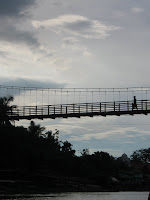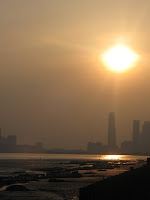Eight-and-a-half months have passed—two-thirds of my time here in Korea is gone. And yet, in some ways, it seems that I have been here eight years. Time has moved in an unbelievable way, like a race car spinning wildly out of control. The weeks pass and I don't know where they've gone. I turn around and my three-year-olds are speaking in complete English sentences. I step back and realize that my five-year-olds are reading, that my clothes smell constantly of pollution and Asian detergent, and that I can sleep through a two-hour commute and never miss a bus or subway transfer.
I have found a crack here where I fit, but still, especially on quiet nights when I look for stars and can’t find them, there are things that I long for from home— the stars, the people, the dusty skies, the desert rain. The rain here smells like bleach, a smell I can’t quite wrap my head around, when every memory I have tells me that rain should smell like chaparral and electricity and dripping desert flowers. At home, the rain was saving, a divine shower of life on the dry desert. Here it is filled with acid, the acrid water eating the roads—a force of nature, but not of life. And yet, there is so much life here .The greenness of this place is as foreign to me as the people, and as unpredictable.
This civilization has been around for millennia, making my own country seem young and naïve, and much less steady than this place that no longer even recognizes the opposition it moves through, does not balk at it, does not complain or feel that it should have an easier lot.
Whereas I, long accustomed to success, find myself torn by the opposition I have found here, indeed, by the very wisdom I am gaining.
Wisdom isn’t cheap, and it certainly isn’t free. The older I get, the more I realize that, of all things in life, wisdom demands one of the highest prices of all, especially for me. The price of wisdom is something that I value deeply, that I cling to tightly.
The price of wisdom is innocence.
It is a price that I tremble to pay.
But I am beginning to see a terrible thing. Ignorance may be bliss, but it is not happiness. And wisdom may leave terrible scars, but they are scars that save. Wisdom sees the complexity in simple things, the sorrow in the joy, and the meaning in the sorrow. Wisdom shows that all of humanity is broken people trying to find a way to be whole.
But still, sometimes I miss the innocence I had before—before I understood poverty, before I really understood sacrifice. Before I saw what it really costs to change. Before I looked at an innocent child and cried inside for what I knew the world would do to them in the coming years. Before I saw such goodness in people who would never understand where goodness comes from. Before I learned in the depth of personal experience how hard the spirit must struggle to remain strong in a broken body. Before, when I could go to a nice restaurant, and not feel the urge to throw up when I saw the prices on the menu, my mind flashing back to the eyes of starving little ones in the Philippines, their tummies slick and bloated in the rain.
I miss the way innocence once made life easy. And I look every day at my kids, still shining with the light of that purity--cruel and tough and brittle and quivering and cutting and forgiving and laughing and brimming over with the raw, bubbling, guile-less honesty that only a child can know. And I mourn for innocence.
But innocence goes and wisdom comes. And as I begin to see the shady corners of the world-- not the geographical corners, but the moral ones, the social ones, the individual corners of emptiness that haunt every heart--I see my own joy become deeper. It is still a reckless joy, still wild, still candid, still exultant over the tiny and mundane, but richer as a whole. I love fog over misty water a little more. I adore crooked stacks of books a little more tenderly. I play hopscotch on fence posts with a little less reserve.
And in all the opposition, I’ve learned that happiness is the easiest thing in the world.
Though I am still not sure, perhaps this makes wisdom worth the price.








































